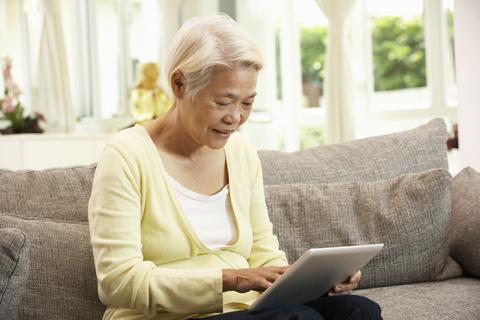How Technology Can Support the Caregiver’s Role and Make Life Easier
 As any caregiver can tell you, being the primary caregiver for a loved one with Alzheimer’s or dementia can be a challenging job on many levels, including physical, emotional and spiritual. Because Alzheimer’s is a progressive disease, the challenges of caring for a loved one typically increase with time in both their frequency and magnitude. The sometimes overwhelming demands that Alzheimer’s can place on a primary caregiver is the chief reason for caregiver burnout, which can include mental and physical exhaustion, depression and an increased likelihood of other medical problems.
As any caregiver can tell you, being the primary caregiver for a loved one with Alzheimer’s or dementia can be a challenging job on many levels, including physical, emotional and spiritual. Because Alzheimer’s is a progressive disease, the challenges of caring for a loved one typically increase with time in both their frequency and magnitude. The sometimes overwhelming demands that Alzheimer’s can place on a primary caregiver is the chief reason for caregiver burnout, which can include mental and physical exhaustion, depression and an increased likelihood of other medical problems.
For caregivers today, it is important to remember that you are only human and you are doing the best you can. Getting help is not a sign of weakness or failure. Rather, seeking out helpful resources can be highly beneficial to you and the loved one for whom you are responsible since their care and well-being depends largely on your own health and ability to function as a caregiver.
The Role of Technology in Caregiver Support
Today, technology can provide useful benefits for caregivers in a variety of forms. Education and information are essential tools for supporting family caregivers and modern technology can help to make those tools more accessible, more effective and provide practical solutions to caregiver related issues.
Technology offers several important benefits to caregivers. It can:
- Help to save time and energy
- More easily manage the logistics of care
- Improve health and safety factors
- Identify helpful caregiver resources
- Reduce caregiver stress and improve quality of care and support to loved ones
National Study Highlights Technology’s Benefits to Caregivers
The recent National Alliance for Caregiving technology study conducted in 2011 was a major research project that sought to measure the value of supportive technology to caregivers and to identify the most useful technologies available. As part of the study, researchers assessed the perceived value to caregivers of 13 different available technologies.
The study concluded that technology benefited caregivers both emotionally and financially and was viewed as a key factor in helping them develop an adequate support system for care.
The top three technologies viewed as “most useful” by caregivers were:
- Personal Health Record Tracking – Websites or software designed to help keep track of a loved one’s medical history, medications and treatments.
- Caregiving Coordination Systems – Comprehensive care coordination websites that assist with calendar scheduling, sharing information and organizing care; electronic logs for medical appointments and healthcare related tasks; software calendar scheduling systems that family members can log into and sign up to help at specific dates and times andprivate online communities that all caregivers can access for information and discussion.
- Medication Support Systems – Systems that provide reminders and instructions for the loved one to take medications when a caregiver cannot be present; they also notify caregivers if the medication was not taken within a certain time frame.
Other technologies were found to be helpful although some were rather costly.These included: Movement Monitoring Systems that track a loved one’s movement in his/her home; Symptom Monitors/Transmitters that electronically send information such as blood pressure to a doctor or care manager; Interactive Systems for Activity (such as Wii Fit) that enable the creation of a schedule of physical activities and mental games and Video Phone Systems, such as Skype, that permit remote interactivity.
Online Networking Support for Caregivers
There are also many interactive online resources that can connect and support caregivers, for example:
- Internet sites that let caregivers interact with one another can reduce isolation
- Sites that can help connect caregivers with family and friends
- Online support networks that are available around the clock
Some examples of useful online caregiver resources today include, Care.com, LotsaHelpingHands.com and Caregiving.com
The good news is that today a variety of resources available to assist caregivers who are caring for their loved one at home. These include Alzheimer’s Association services, support groups, self-help guides, respite care services, in-home support, community-based services and educational programs.
For caregivers who recognize that the needs of their loved one are beyond what they can safely and appropriately provide in the home environment, leading memory care assisted living communities (MCALs) such as North Woods Village at Edison Lakes and its “New Directions” SM are available to assist you. MCALs provide a safe, professional environment and proven, “best-practice” programs and services specifically designed to address the total physical, emotional and social needs of individuals with Alzheimer’s, dementia or other serious form of memory impairment.
For more information on how North Woods Village can help you and your loved one cope with early state dementia, contact us today!
